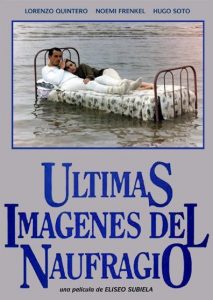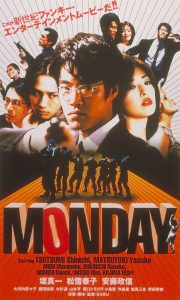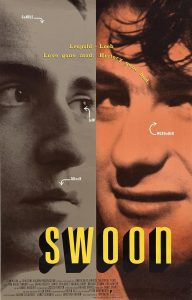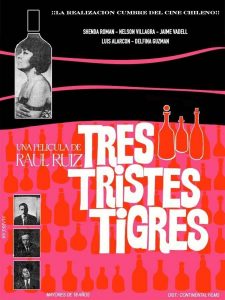 Original title: Últimas Imágenes Del Naufragio
Original title: Últimas Imágenes Del Naufragio
Year: 1989
Director: Eliseo Subiela
Country of origin: Argentina
Roberto is an insurance salesman, but sets out to write a novel to escape the routine of his everyday life. By chance, he meets Estela, a mysterious young woman who dominates him more and more. Roberto meets Estela’s family and, as he gets to know them, he becomes trapped in a web where fantasy, madness and violence intertwine. There he encounters a decomposed human group, on a vertiginous descent into the past, clinging to hopes that still exist like castaways desperately struggling to survive. Winner in eight categories at the Silver Condor Awards, including best film, director, original screenplay and soundtrack.
 Original title: L’arme à gauche
Original title: L’arme à gauche
Year: 1965
Director: Claude Sautet
Country of origin: France
An adventure film. Violent, direct, turbulent. Setting: the Caribbean Sea and, more precisely, a stranded boat. Characters: on the one hand, arms dealers, led by a thug who fires a machine gun without thinking; on the other, a man who may not be very intelligent, but who knows the sea and boats and has the simple courage of honest people; and there is also a beautiful widow. It’s a movie of gestures and glances; it’s also a movie of silences, which play just as much of a dramatic role in the action as the fights. It’s a film of various objects, in which the hero leads his fight on two fronts: against men first, but also against this inanimate boat that he is trying to bring back to life.
Source: translated and adapted from Le Monde.
 Year: 2000
Year: 2000
Director: Simon Cellan Jones
Country of origin: United Kingdom
“Some Voices” takes the schizophrenia of the protagonist, Ray, as the central axis from which it derives reflections on family and love relationships, the effectiveness of psychiatric drugs, social assistance policies, among other subjects. The film is an adaptation of a play written by Joe Penhall, creator of the US series Mindhunter. It was nominated for best newcomer director at the BAFTA Awards, the UK’s biggest film awards, and features a cast of well-known names such as Daniel Craig, David Morrissey and Kelly Macdonald.
 Original title: マンデイ
Original title: マンデイ
Year: 2000
Director: Sabu
Country of origin: Japan
A grand mix of strong storytelling, refreshing comedy, perfect timing, upbeat music and a touch of the absurd. The film consists of only 8 or 9 scenes in total, each of them somehow locked in their own little universe, tied together by the memories of the protagonist Takagi, who wakes up in an unfamiliar hotel room. Half asleep and still startled by his surroundings he searches his pockets for clues. He finds a small packet that slowly refreshes his memory and little by little we wtiness Takagi trying to paste together his journey of how he got to the hotel room, a journey with increasingly absurd consequences. Winner of the Don Quixote special prize at the Berlin International Film Festival and a FIPRESCI award “For its austere, dark wit and keen eye for human foibles”.
Source: adapted from Onderhond.
 Year: 1992
Year: 1992
Director: Tom Kalin
Country of origin: United States
Shot in the hauntingly stylish manner of avant-garde advertising, the black-and-white “Swoon” is a tricky, unpredictable synthesis of the mannered and the real. Its posing flappers, floating archly past the camera in the film’s opening moments, bespeak a pointed artificiality, but the passion between Nathan Leopold and Richard Loeb is urgent and real. The cruel decision to kill a schoolboy (who is actually a relative of one of the killers) is later seen as part of this same intoxicatingly romantic spell. “Killing Bobby Franks together would join Richard and me for life,” Nathan later says at his trial. Based on a real murder case, the film won Best Cinematography at the Sundance Film Festival and Best Film at the Berlin International Film Festival.
Source: adapted from The New York Times.
 Original title: Tres Tristes Tigres
Original title: Tres Tristes Tigres
Year: 1967
Director: Raúl Ruiz
Country of origin: Chile
Based on the play of the same name by Alejandro Sieveking, “Three Sad Tigers” is the first feature film in the extensive career of Chilean director Raúl Ruiz. The film is a cinematic interpretation of the atmosphere and spirit of Chile’s capital at the end of the 1960s, on the eve of President Salvador Allende’s electoral triumph. We follow a few days in the life of characters that Ruiz defines as “marginals in their own social classes”, through unstable images from a hand-held camera, uncertain times and diffuse spaces, a realistic approach to cinema that was innovative in its break with the Hollywood melodramas distributed in Latin America at the time. It was awarded the Golden Leopard, the main prize at the Locarno Film Festival.
 Original title: Borotalco
Original title: Borotalco
Year: 1982
Director: Carlo Verdone
Country of origin: Italy
“Talcum Powder” is characterized by a sense of unconscious tenderness of the protagonist, a mixture of danger and insecurity, recklessness and frankness. These essential characteristics of the protagonist, Sergio, are also a portrait of a youth in the early 1980s, at the height of life in a period of optimism and well-being, with the decades of protests and terrorism apparently overcome and the full irruption of globalization still a long way off. It’s a sweet movie in the best sense, a funny story in which few things turn out the way you’d expect and which, even with the typical melancholy of director Carlo Verdone, represents well the snapshot of a precise moment in Italian cinema and society. Winner in five categories, including Best Film, at the David di Donatello Awards, Italy’s main film awards.
Source: translated and adapted Anonima Cinefili.
 Original title: Últimas Imágenes Del Naufragio
Original title: Últimas Imágenes Del Naufragio




 Original title: L’arme à gauche
Original title: L’arme à gauche Year: 2000
Year: 2000 Original title: マンデイ
Original title: マンデイ Year: 1992
Year: 1992 Original title: Tres Tristes Tigres
Original title: Tres Tristes Tigres Original title: Borotalco
Original title: Borotalco
